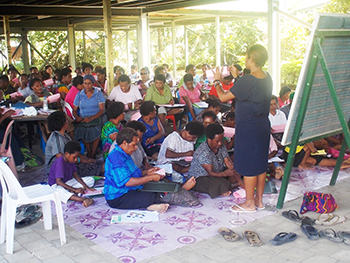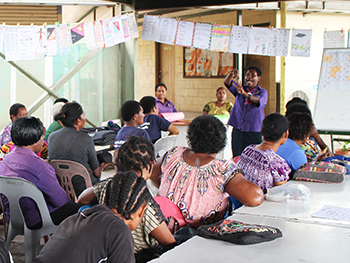Has Anglicare’s PNG’s adult literacy program really made a difference?
To find out if adult literacy students’ lives are changing in PNG, one way is to ask the students themselves. ABM’s Kate Winney and Mavis Tito did just that when they visited the diocese of Aipo Rongo in September 2018.
The students and former students spoke about how literacy classes had changed not only the students themselves but also their communities:
- An assistant teacher Jean said, “Now the women are taking roles in the church, taking part in activities and contributing ideas into the community.”
- Mary in Togban village said, since learning how to read and write, she had begun collecting anything that had writing on it, even scraps of paper on the roadside. She read them because she could now understand what she was reading.
- June from Kuima village said she had always wanted to do missionary work, but because she was uneducated, she could not and was deeply affected by it. When Adult Literacy (AL) was introduced in her community, she jumped at the opportunity and enrolled. Several years later she learnt how to confidently read and write. What is extraordinary about this woman is that she didn’t even know how to speak Pidgin (PNG’s second National language after English). She learnt how to speak Pidgin through Adult Literacy classes and now participates in Bible reading in Church. June also said that the literacy classes had made her more ambitious. Prior to her attending Adult Literacy, all she cared about was working in her garden and raising pigs. Adult Literacy had opened her eyes and made her realize that she actually could do more than just gardening. She aspired to buying a sewing machine so she could sew and sell clothes, save some money and then start a chicken farm.
Benjamin in Kwiop village wanted to engage in religious work but was unable to because he had difficulties with reading (he had never attended school). He enrolled in Anglicare’s Adult Literacy program. After graduating a few years later, he was appointed a Pastor in the community. He has been happily rendering Pastoral duties since 2017.
- Peter declared that the literacy program had made the local community more united and more active. The learners themselves built the classroom. And when the classroom was leaking, the community mobilised resources and labour and fixed it. The community had even gotten together to build a road.
- Laurence in Kuima, said he had moved from darkness to light. He never attended school. Before attending literacy class, he said he didn’t know how to manage his family but literacy had changed him. He now knew how to give change at the market and read the doctor’s instructions. ‘I cannot change all my family, I am only one person so I can change myself.’ Laurence has since been elected as the Parish Chairman, and now reads the bible in intercession. Laurence says ‘My next plan is to study English and study life skills.’
And quantitative data suggest that the impacts are widespread:
During FY 2017/18, 1,963 learners attended literacy classes organised by Anglicare and Anglican dioceses.
- At least 60 of the more advanced learners from Port Moresby and Popondetta Dioceses transited to formal education or employment. These included seven adult literacy students who graduated in Port Moresby in November 2017 and were immediately accepted into vocational courses. Another graduate was accepted into secondary school.
- Awareness-raising through the CPP program reached an audience of thousands. For example, CPP program staff joined in celebrating PNG National Literacy Week in the Central Province and in another national event to raise awareness about Gender Based Violence. For World Aids Day on 1 Dec 2017, four out of the five dioceses actually organised their own awareness-raising events. Anglicare reported that, in Aipo Rongo Diocese, ‘Live radio interviews were aired through Eagle FM and N (Radio) … and continued for few more weeks after World Aids Day’.
Local people’s actions can sometimes reveal more than their words. When local people make contributions like the following, it shows they strongly believe that the program is lifting them up:
One adult literacy teacher in Jimi Valley not only taught voluntarily in her own community but also in another community that was four hours walk away!
- Due to the high demand for AL resulting in a large number of learners currently enrolled, a volunteer assistant teacher was recently engaged. The volunteer has attended teacher trainings under CPP.
- One community had set aside and cleared 10 hectares of land for income generation (rice farming) for teachers’ allowances.
ABM, Anglicare and the Anglican Church of PNG need to work to continually improve aspects like the sustainability of literacy schools, program cost-efficiency, broadening of curricula for some communities, and overall record-keeping. But the words of the students themselves show that the program is having an impact in many, many communities. It is a program worth keeping.
To support this program, donate to ABM’s PNG Adult Literacy project

Anglicare PNG Adult Literacy Level 1 Gender Awareness class ©Anglicare PNG, 2017
